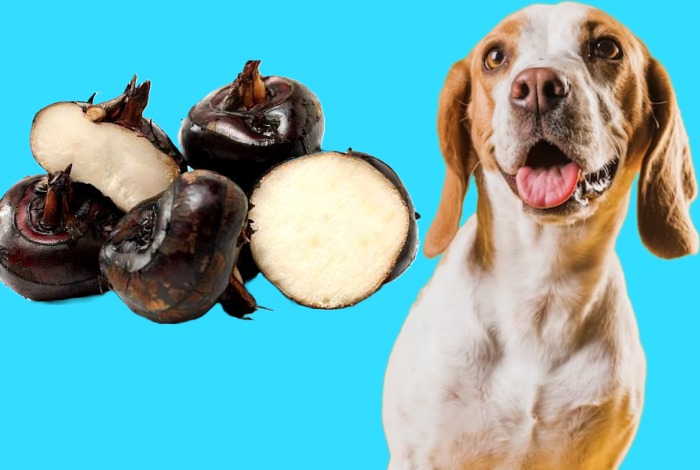Can canines consume water chestnuts? In a number of side dishes and salads, water chestnuts are frequently utilized. Even some people wrap them in bacon! But can our dogs consume water chestnuts without becoming sick?
The quick answer is Yes, water chestnuts are safe for dogs. As a rare treat, dogs would undoubtedly be rather interested in a water chestnut covered in bacon. The best method for dogs to eat these, however, is obviously raw or just cooked.
But you must speak with your vet before introducing any new items to your dog’s diet. Here is everything you need to know about how water chestnuts can be a nutritious treat for your dog in the meantime.
What is Water Chestnut?
Eleocharis dulcis, often known as water chestnut, is a kind of aquatic plant that yields edible corms, sometimes known as “water chestnuts.” Contrary to their name, water chestnuts are actually submerged corms that grow in marshes, ponds, and slow-moving rivers. They resemble tubers rather than nuts. These corms are a widely used element in many different cuisines, especially Asian meals.
Water chestnuts have a nutty, slightly sweet flavor and a crisp texture. They frequently offer a distinctive texture to foods when used both raw and cooked.
Water chestnuts are renowned for their nutritional advantages in addition to their culinary usage. They offer dietary fiber, potassium, numerous vitamins and minerals, and are low in calories and fat. They are a sought-after ingredient for adding crunch to recipes because of their crisp texture and capacity to maintain firmness when cooked.
Can Dogs Eat Water Chestnuts?
In actuality, fresh water chestnuts are really beneficial for your pets. They include a lot of potassium, a mineral that is healthy for the heart of your dog. Dogs are not toxic to water chestnuts, and even little amounts are unlikely to be harmful.
Remember that some dogs may be sensitive to or allergic to particular foods, so it’s best to introduce new meals gradually and moderately while keeping an eye out for any negative reactions.
Can Dogs Eat the Skin of Water Chestnuts?
Dogs cannot be poisoned by water chestnuts, although dogs may have trouble digesting the stiff skin. It’s normally advised to remove the peel before giving water chestnuts to your pet, while little amounts may not necessarily hurt him. If your dog tries to ingest a larger chunk of the skin, it may result in gastrointestinal problems or pose a choking risk.
Why Are Water Chestnuts Good for Dogs?
Dogs can enjoy little pieces of water chestnuts as a highly wholesome, low-calorie treat.The health of your pets will benefit greatly from freshwater chestnuts. They have a high potassium content, a mineral necessary for keeping the heart health of your dog.
These chestnuts can improve your dog’s general health when they are included in their diet. These chestnuts assist ideal heart function since they are a rich source of essential nutrients such vitamin B6, vitamin C, potassium, omega-3 fatty acids, and vitamin B6.
Another key benefit for your pets’ hydration and wellbeing is provided by the freshwater chestnuts’ high water content, as their name suggests.
While water chestnuts may have some advantages, your dog’s usual diet shouldn’t be substituted with them. Dogs have particular dietary needs, thus any supplements should be complementary rather than dominant.
1. Can dogs eat sugar snap peas and water chestnuts?
Sugar snap peas are generally safe for dogs when given in moderation as a treat. However, water chestnuts are not recommended for dogs, as they may be difficult for them to digest and can cause digestive issues. Always introduce new foods in small quantities and monitor for any adverse reactions.
2. Are water chestnuts inflammatory?
Water chestnuts are not typically considered inflammatory, and they are a low-calorie vegetable often included in various dishes. However, their impact on an individual’s health can vary, so it’s best to consult with a healthcare professional for specific dietary concerns.
3. Do water chestnuts digest easily?
Water chestnuts are relatively easy to digest for most humans. However, dogs have different digestive systems, and some may struggle with certain foods. Water chestnuts may not be well-tolerated by dogs and can lead to digestive upset, so it’s advisable to avoid feeding them to your canine companion.
4. What if my dog eats chestnuts?
Chestnuts are not typically toxic to dogs, but they can be difficult to digest and may cause stomach upset. If your dog has eaten chestnuts and shows signs of discomfort, such as vomiting, diarrhea, or lethargy, consult your veterinarian for guidance. It’s best to stick to dog-appropriate treats and foods to ensure your pet’s well-being.

